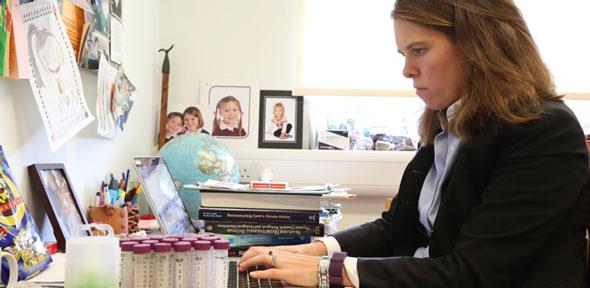
Launched in 2013, the Returning Carers Scheme has helped dozens of Cambridge researchers get their research careers back on track. Geochemist Dr Alexandra Turchyn talks about the challenges of returning from maternity leave and why she credits the...
“It’s an ingenious scheme. It shows that small pockets of money used in the right way can be a powerful way to support women in challenging careers”
Dr Alexandra Turchyn, Department of Earth Sciences
Dr Alexandra Turchyn remembers when the email announcing the new Returning Carers Scheme (RCS) dropped into her inbox. For Professor Jeremy Sanders, who piloted the scheme in 2012, it was designed to improve the gender balance of academic staff by ensuring more women were eligible for promotion. For Turchyn, it was a lifeline.
“When the email arrived in September, I was two months into my maternity leave,” she recalls. “I was going to be returning to my lab – and a mountain of work – in October, and when I read the email it felt like the University was sending me a lifeline.”
The scheme provides funds to help returning carers re-establish their research profiles and kick start academic activity after a significant period away from work. And it was exactly what Turchyn needed.
“For me and many women, the biggest challenge of returning from maternity leave is time management – having enough hours in the day to get everything done,” she says.
“Until I went on that maternity leave I was doing ten to 12 hours lab work a week. It was work that had to get done – like weighing samples from collaborators and getting them into the mass spectrometer. But it was work that didn't require me to do it, and time that I no longer had.”
Deciding that an extra pair of hands would make all the difference, Turchyn applied for £8,600 from the RCS to employ an assistant for 25 hours a week for six months.
“I was awarded the money and that winter transformed my career,” she explains. “Since I finished my PhD in 2006, I had published two or three papers a year; that winter I published six. I just sat and wrote and cleared my desk.”
Having boosted her publication record, she felt confident enough to apply for promotion to Reader last year. And as well as securing promotion, the RCS changed the way she saw herself.
“The scheme helped me manage my time better. Being on top of things meant that – for the first time – I could see myself as a group leader, not just someone working in a lab and trying to keep everything together. And I credit it with putting me in a position to apply for promotion last summer.”
According to HR Business Manager Sarah Botcherby, Turchyn’s success is a great illustration of what the scheme is for and the difference it can make. But, she says, it’s not only for women returning from maternity leave.
“The scheme is open to anyone who has taken time off for caring over the last five years. We encourage men to apply too, and those who may have had to work reduced hours to care for an elderly parent, for example.”
Since the scheme was launched across the University in 2013, it has attracted 184 applicants, 135 of whom have been successful. With a budget of £300,000 a year, the scheme funds applications of up to £10,000, which researchers have used for research support, to attend conferences, purchase equipment not covered by other sources of funding, and buy out teaching.
Turchyn believes the scheme shows that modest amounts of money targeted correctly are a powerful way to support women in challenging careers.
“There are unique challenges when you’re trying to balance a career with children or other caring responsibilities. Caring leave falls disproportionately to women, and women are haemorrhaging from these careers,” she says.
“The question is, what can we can do to plug the gap? My success with the scheme shows it doesn’t take much money to right the ship. I think it’s an ingenious scheme.”
A new (sixth) round of funding is likely to be available in the next few months. More information on the scheme can be found via the weblink top right.
